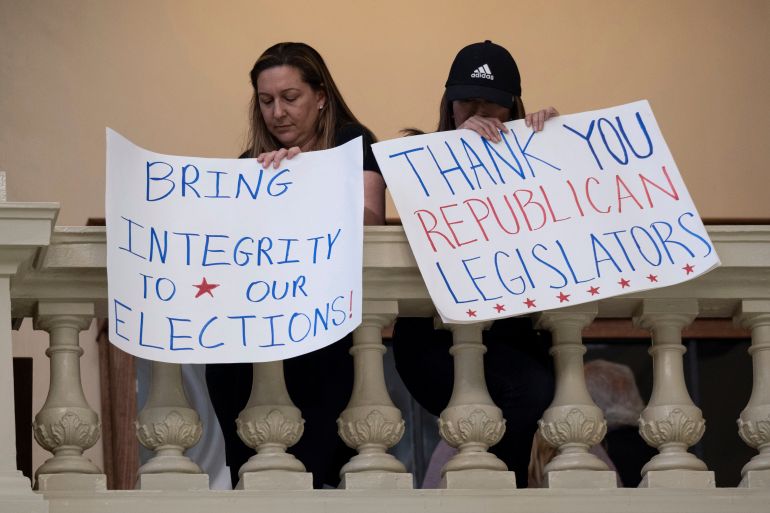After 2020 losses US Republicans move to limit voting rights
Democratic wins in Georgia, Arizona, Pennsylvania sent ‘shockwaves’, prompting Republicans to curtail voting methods

Former President Donald Trump was trying to disqualify a few thousand votes in Georgia, enough to help him win the 2020 US presidential election.
“Look, all I want to do is this. I just want to find 11,780 votes, which is one more than we have, because we won the state,” Trump told Georgia’s Republican Secretary of State Brad Raffensperger in a now-infamous telephone call.
Keep reading
list of 4 itemsGeorgia counties sue Trump over failed election challenges
Biden says Trump refusal to concede ‘an embarrassment’
Obama: Trump election challenge ‘delegitimising’ democracy
Trying to overturn Joe Biden’s win, Trump berated Raffensperger alleging tens of thousands of fraudulent votes had been cast through ballot stuffing, dead people, out-of-state voters, and phoney signatures on mail-in ballots.
It was not true, Raffensperger assured the president. Now, Republican legislators in Georgia, stung by losses in the 2020 elections, are moving to find the votes Trump needed – by restricting future voting in the state.
“Biden’s election, even though it should not have been a surprise, and the Senate special elections in Georgia sent shockwaves through conservative and Republican ranks,” said Chris Sautter, a Democratic consultant based in Washington, DC, who specialises in election law.
Adding to the Republican pain in Georgia, two incumbent Republican US senators lost runoff contests to Democratic challengers in January, giving Democrats control of the US Senate.
The Republican-controlled Georgia General Assembly is advancing proposals that would restrict ballot drop boxes, end no-excuse voting by mail, end automatic voter registration and limit early voting.

If the proposed bills become law, they would end the widespread use of mail-in ballots in Georgia and potentially curtail Sunday get-out-the-vote drives by Black churches.
“If you buy into the Trump conspiracies, it’s positive for legislators who think the election was stolen,” said Charles S Bullock, professor of politics at the University of Georgia.
Influenced by Trump’s claims of fraud, 67 percent of Republican voters nationwide believe the 2020 election was invalid, according to a recent survey by the R Street Institute, a conservative think-tank based in Washington, DC.
“This has become so popular with Republicans, you may not be able to rein them in. The governor and Republicans might see this as a way to get back in the good graces of Trump voters,” Bullock told Al Jazeera.

In Arizona, a state Biden won, Republicans are advancing more than 50 bills addressing voting and elections.
“The major flaw that we have identified and we’re trying to correct is dealing with election fraud,” said Representative John Kavanagh, the Republican chairman of the Arizona House of Representatives committee on elections.
“There’s a concern that there are a large number of early ballots being mailed out to people who are no longer there because they died, or they moved out of state,” Kavanagh told Al Jazeera.
Asked whether there is any evidence of widespread ballot fraud in Arizona, Kavanagh said, “It’s hard to tell because we would have no way of knowing.”
Meanwhile, the Arizona Senate has subpoenaed voting machines and two million ballots from the state’s largest county and Republican leaders intend to conduct their own investigation after state officials certified the results.

Voting rights advocates have argued that while the proposed bills individually would make small, seemingly reasonable changes to voting laws, combined they would add up to a sweeping restriction of voting rights.
“If one were to objectively draw a through-line through most of these bills, they’re actually reacting to the ‘Big Lie’,” said Alex Gulotta, Arizona state director for the All Voting is Local Campaign.
“They are actually reacting to falsifications about what happened in the last election and creating new policies to address basically, fictitious circumstances that did not, in fact, ever exist,” Gulotta told Al Jazeera.
Trump’s complaints about the election have triggered a national wave of more than 250 legislative proposals in 43 states to make it harder to vote, according to a report by the Brennan Center for Justice, a policy institute at New York University.
Already, the movement is yielding results. In Iowa, the Republican governor has signed into law a Republican-backed bill that cuts the state’s early voting time period and closes polling places earlier.
“The rising percentage of Latinos, Blacks and young people in these states that Biden carried – Georgia and Arizona, in particular – have just underscored that Republicans are facing a harsh demographic and political reality,” Sautter told Al Jazeera.
“These states are no longer safe red states. And what they’re trying to do – in plain sight – they are trying to change the rules to make it more likely that they can compete in these states,” Sautter said.
Biden, in 2020, became the first Democratic presidential candidate to win Georgia in 24 years after 1.3 million voters cast their votes by mail, pushing total turnout to a new high. He edged out Trump, the Republican, by just 11,779 votes out of five million cast.
Biden won Arizona by a narrow margin of 10,457 votes out of a historic 3.4 million votes cast, 88 percent of which were cast early. Biden, who was the first Democratic presidential candidate to win the state since 1996, received more than 60 percent of Arizona’s Latino vote.